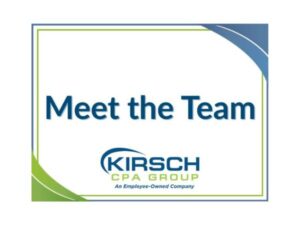Understanding the CPA’s Role in Detecting Fraud
Kirsch CPA Group
Sep 25, 2023

A role of CPA’s is to act as “gatekeepers,” emphasizing their responsibilities for identifying fraud risks and detecting material misstatements in the financial statements. These responsibilities are currently at the forefront due to changes to the macroeconomic and geopolitical environment that may lead to fraud.
Fraud Triangle
Three elements are required for fraud to happen. First, the perpetrator must experience some type of pressure that motivates the fraud. Motives may be personal or come from within the organization. Second, the perpetrator must mentally justify (or rationalize) the fraudulent conduct. Third, perpetrators must perceive and exploit opportunities that they believe will allow them to go undetected.
It’s important to remember that the presence of these three elements doesn’t prove that fraud has been committed — or that an individual will commit fraud. Rather, the so-called “fraud triangle” is designed to help organizations identify risks and understand the importance of eliminating the perceived opportunity to commit fraud.
Conditions Ripe for Fraud
In today’s volatile market conditions, it’s important to evaluate how economic conditions have altered workers’ motivations, opportunities and abilities to rationalize fraudulent behavior. For example, unethical managers may conceal deteriorating performance with creative journal entries to avoid loan defaults. Or they may attempt to inflate sales to preserve their bonuses — or simply their jobs.
Roughly three-quarters of HR leaders are currently undertaking or considering layoffs, according to a recent survey by recruitment firm Lee Hecht Harrison. Employees with unemployed spouses due to layoffs may rationalize theft so that they can pay their own bills. Layoffs may also spread the remaining employees thinner, making it harder to implement strong internal control procedures, such as supervisory review and segregation of duties.
Likewise, owners and top managers may be distracted from fraud prevention and detection efforts as they scramble to recover lost sales or focus on cost containment in the face of inflation. And employees working harder without more pay — and with personal financial problems — may be more likely to rationalize a fraudulent act.
Fraud vs. Errors
Auditing standards require auditors to plan and conduct audits that provide reasonable assurance that the financial statements are free from material misstatement. There are two reasons an organization misstates financial results:
- Fraud, and
- Error.
The difference between the two is a matter of intent. The Association of Certified Fraud Examiners (ACFE) defines financial statement fraud as “a scheme in which an employee intentionally causes a misstatement or omission of material information in the organization’s financial reports.” By contrast, human errors are unintentional.
Role of the Auditor
The following areas are where some auditors may fall short on their gatekeeping responsibilities:
- Lack of substantive procedures that would be specifically responsive to fraud risks,
- Insufficient journal entry testing,
- Failure to assess or identify a revenue recognition as a potential fraud risk, and
- Not adequately communicating with audit committees about fraud risks.
It’s important to note that audits don’t provide an absolute guarantee against misstatement. They only provide reasonable assurance that fraud and errors will be detected.
To Catch a Thief
If you suspect employee theft or financial misstatement, contact Kirsch CPA Group to assess your company’s risk profile and determine whether fraud losses have been incurred. We can also help you implement strong controls to prevent fraud from happening in the future and minimize potential fraud losses.
Have you Considered a Surprise Audit?
Compared to a traditional financial statement audit, a surprise audit more closely examines the company’s internal controls that are intended to prevent and detect fraud. Here, auditors aim to identify any weaknesses that could make assets vulnerable and determine whether any employees have already exploited those weaknesses.
Fraud perpetrators likely have paid close attention to how previous financial statement audits were performed — including the order in which the auditor proceeded. In a surprise audit, the auditor might follow a different process or schedule. For example, instead of beginning audit procedures with cash, the auditor might first scrutinize receivables or vendor invoices.
Surprise audits may target high-risk areas such as inventory, receivables and sales. Auditors show up unexpectedly — usually when the owners suspect foul play — or randomly as part of the company’s antifraud policies. The element of surprise is critical because most fraud perpetrators are constantly on guard. Announcing an upcoming audit gives wrongdoers time to cover their tracks by shredding (or creating false) documents, altering records or financial statements, or hiding evidence.
The primary advantages of surprise audits are fewer financial losses and reduced duration of schemes. The median loss for organizations that conducted surprise audits was $75,000, compared with a median loss of $150,000 for those organizations that didn’t — a 50% difference, according to the 2022 Report to the Nations. And the median duration in those organizations was 18 months, compared with only nine months for organizations that performed surprise audits. An auditor’s finding of suspicious activity in a surprise audit will likely require additional forensic investigation.
We can help you tackle business challenges like these – schedule an appointment today.
© Copyright 2023. All rights reserved.
More Resources

About The Author
Kirsch CPA Group is a full service CPA and business advisory firm helping businesses and organizations with accounting,…
Sign Up for Email Updates
Tags
Accounting & Financial News

Why Silence About Fraud Only Makes It Worse
Business owners generally experience a range of emotions — including anger, bewilderment and embarrassment — if fraud…




